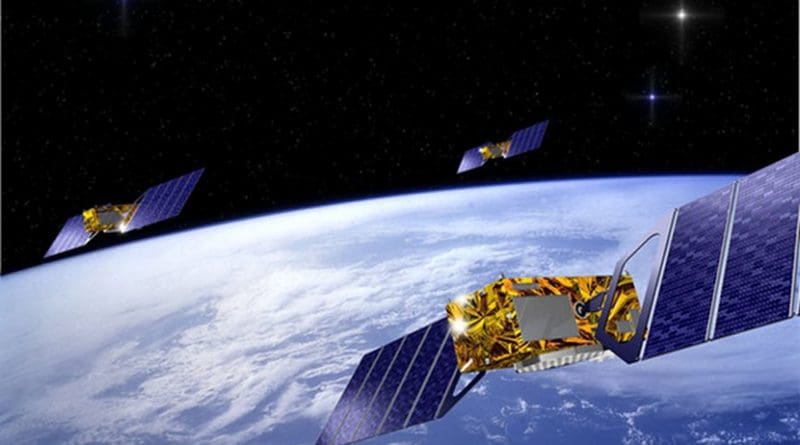Eying Extraterrestrial Threats, NATO To Create Space Center In Germany
By EurActiv
By Alexandra Brzozowski
(EurActiv) — NATO defence ministers on Thursday (22 October) are expected to approve a plan to create a new space centre at the alliance’s Air Command in Ramstein, Germany, in response to growing concerns over protecting satellite and navigation assets from enemy interference.
The plans were first reported earlier on Monday by German press agency DPA and the daily Süddeutsche Zeitung.</em
According to the reports, the base would join with the NATO air force high command in Ramstein, in the German state of Rhineland-Palatinate, and would serve primarily as a coordination centre for space observation.
It would gather information about possible threats to alliance satellites and likely be further developed into a command centre for defensive measures.
“Satellite systems keep our world running in ways many people barely realize. Commerce, weather forecasts, mobile phones and banking all rely on satellites,” NATO Secretary General Jens Stoltenberg told Deutsche Welle.
According to dpa, NATO is also planning to develop a centre of excellence devoted to military space, for which France and Germany have expressed interest to be the host country.
Stoltenberg told reporters on Wednesday (21 October), the decision “will be a focal point to support NATO missions with communications and satellite imagery; share information about potential threats to satellites; and coordinate our activities in this crucial domain”.
“Our aim is not to militarise space,” Stoltenberg said, “but to increase NATO’s awareness of challenges in space, and our ability to deal with them.”
The new push comes after NATO leaders last year declared space to be the alliance’s “fifth domain” of operations, after land, sea, air and cyberspace, in response to growing concerns over protecting satellite and navigation assets from enemy interference.
Around 80 countries have satellites, and private companies are moving in too, but the military alliance does not possess its own space technology and relies on the technical capabilities of its members.
As only nine of the 29 NATO member states are part of a mostly peaceful independent space program, experts then pointed out the announcement has more political than practical character, taking into account the fact that the US, Russia, China and India have long since established strong military structures for averting attacks from outer space.
Among European NATO members, only France has taken its own approach and presented a national space strategy.
Europe’s satellite systems, Galileo, EGNOS and Copernicus, are vulnerable and must be protected — all the more so because they are used by both civilians and the military, General Michel Friedling, head of France’s new Space Command, told an audience earlier this year.
He also warned of “grey actions” in space that have so far stopped short of being hostile, but the liberal and non-binding environment could soon encourage such actions.
At present, there is only one weak barrier that forms the basis of international space law and prevents militarisation of space.
“Some nations – including Russia and China – are developing anti-satellite systems which could blind, disable or shoot down satellites and create dangerous debris in orbit. We must increase our understanding of the challenges in space and our ability to address them,” Stoltenberg said in a statement ahead of the meeting.
For the moment, the military alliance insists that its “approach will remain defensive and fully in line with international law.”
However, despite the strides being made in the “fifth domain,” Stoltenberg has repeatedly said over the last year that “NATO has no intention to put weapons in space.”
The 1967 Outer Space Treaty was initially concluded between the US, the UK and the Soviet Union, and has 109 countries as parties, with another 23 having signed the treaty but not completed ratification.
The accord prohibits the placing of nuclear weapons in space, limits the use of the Moon and all other celestial bodies to peaceful purposes only, and establishes that space shall be free for exploration and use by all nations, but that no nation may claim sovereignty of outer space or any celestial body.
“We have to be realistic,” a NATO source told EURACTIV last year when the idea of an alliance space policy was first introduced, “we will not avoid having a discussion about space regulation very soon to avoid unnecessary misunderstandings.”

